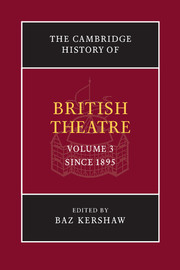Book contents
- Frontmatter
- Part I 1895–1946
- Part II Scottish and Welsh Theatres, 1895–2002
- 9 Towards national identities: theatre in Scotland
- 10 Case study: Ena Lamont Stewart’s Men Should Weep, 1947
- 11 Towards national identities: Welsh theatres
- 12 Case study: refashioning a myth, performances of the tale of Blodeuwedd
- Part III 1940–2002
- Bibliography
- Index
- References
11 - Towards national identities: Welsh theatres
from Part II - Scottish and Welsh Theatres, 1895–2002
Published online by Cambridge University Press: 28 March 2008
- Frontmatter
- Part I 1895–1946
- Part II Scottish and Welsh Theatres, 1895–2002
- 9 Towards national identities: theatre in Scotland
- 10 Case study: Ena Lamont Stewart’s Men Should Weep, 1947
- 11 Towards national identities: Welsh theatres
- 12 Case study: refashioning a myth, performances of the tale of Blodeuwedd
- Part III 1940–2002
- Bibliography
- Index
- References
Summary
For a good part of the last hundred years theatre in Wales has been prejudiced by the dominance of one imported model – ‘good quality mainstream theatre in the literary tradition from Shakespeare through Ibsen and Shaw to our contemporary writers’ – and by the widespread assumption that no indigenous theatre existed until the Arts Council assumed the responsibility for creating it. This is the more ironic because Wales had produced in the relatively recent past an indigenous theatre which demonstrates that it can flourish without the advantages of wealth and cultural continuity, on the basis of a distinctive and particularly vibrant compact between audience and performer. This was the theatre of the Anterliwt, which flourished in rural Wales during the later eighteenth and the earlier nineteenth centuries. Satirical and celebratory, moralistic and indecent, the texts produced in this theatre projected the immediate realities of contemporary rural life against the background of traditional moral teaching. Written or adapted for particular occasions, they were presented in improvised spaces by two or three performers, amongst whose performative skills the ability to turn an appropriate song to a popular tune, Welsh or English, clearly ranked highly. Because the society it served lacked the wealth needed to create permanent structures and practices, this indigenous folk theatre disappeared completely when its social base was under-mined. The example of the Anterliwt reminds us that the fundamental condition of theatre is the existence of a social group or groups within a cultural community who see it as in their interests to function as an audience.
- Type
- Chapter
- Information
- The Cambridge History of British Theatre , pp. 242 - 272Publisher: Cambridge University PressPrint publication year: 2004
References
- 2
- Cited by

